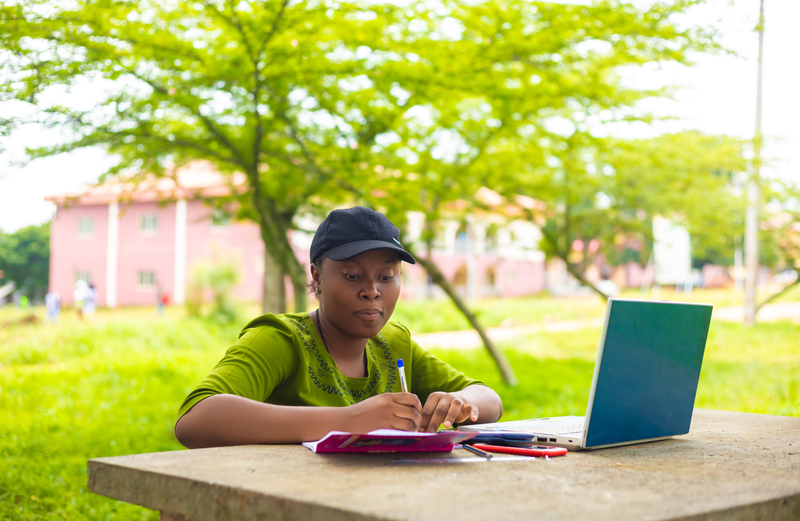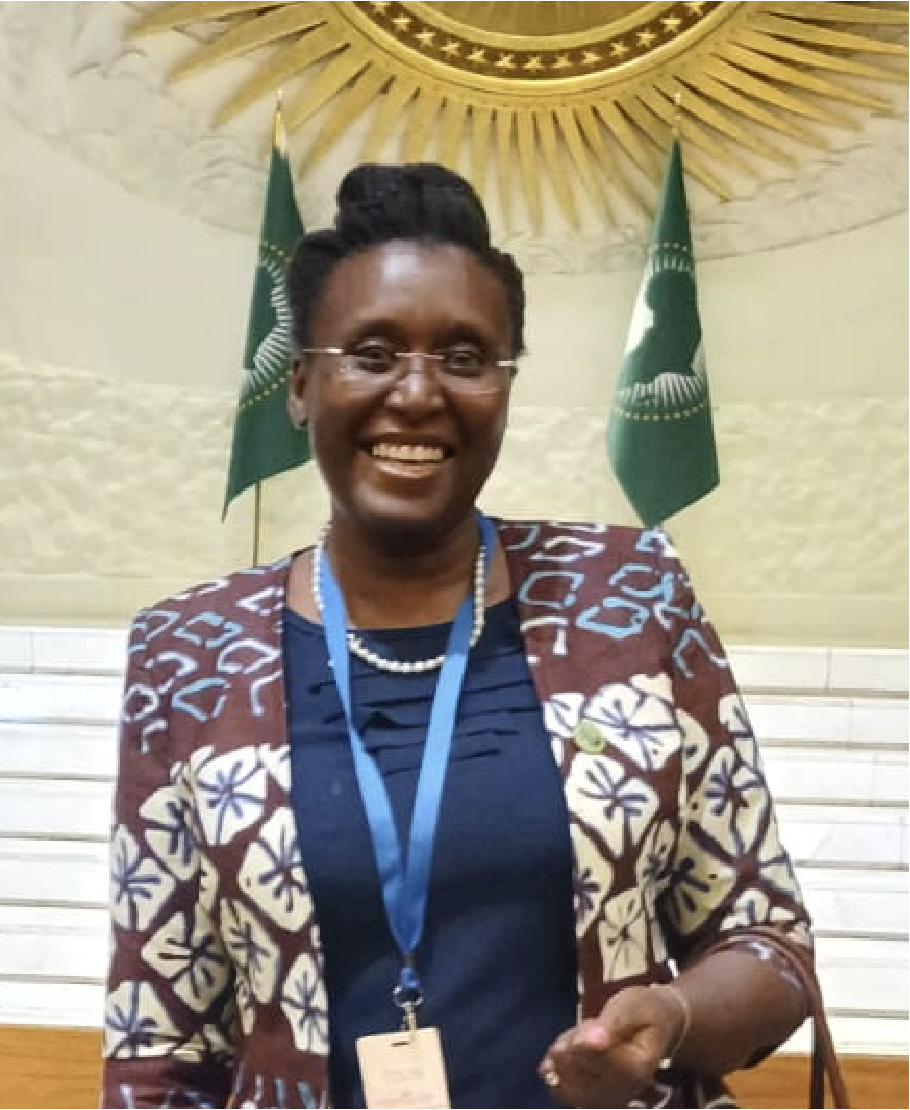Insights on the Year of Education

On the sidelines of the 37th African Union Summit, AUDA-NEPAD’s Human Capital and Institutions Development Directorate hosted a series of events aligned with the launch of this year’s AU Theme, titled “Educate and Skill Africa for the 21st Century,” commonly referred to as the Year of Education.
Leading the coordination of these activities was Ms. Unami Dube, Senior Programme Officer, Institutional Development. Here are her insights:
 Tell us about this year’s theme. What is the rationale behind it?
Tell us about this year’s theme. What is the rationale behind it?
This theme puts a spotlight on the dire state of education in many African countries. This follows a study conducted by UNESCO in 2022 post the COVID-19 era, which showed that many countries were off course and would not be able to meet the targets of Sustainable Development Goal # 4. The study found that many young children face myriad barriers which prevent them from accessing education. Moreover, the schooling systems are not able to avail quality education that can equip young people to achieve their full potential. This is due to poor infrastructure, shortages of teachers and appropriate learning guides to mention a few. This bleak state of affairs on Africa’s human capital seriously undermines individual countries and the continent as a whole to achieve its aspirations towards a prosperous and inclusive future as set out in Agenda 2063. As a result, this year’s theme builds on global efforts to rally policy makers and stakeholders to think deeply about how we can do things differently and better to equip, empower children and young people for a brighter future.
Statistics indicate that in Africa, as many as 98 million children and young people within the official age range are not enrolled in pre-primary, primary, secondary, or higher levels of education. What does this imply for the continent, and what impact does it have on Africa’s economic growth prospects?
Let’s bring the story closer to home. Education is the foundation for social and economic development. Looked at holistically, the schooling environment nurtures talent, potential and a child’s ability to grasp social abilities, scientific and conceptual thinking as well as build self confidence of a child. When it said that nine out of ten children cannot read by the fourth grade, this means that they have missed a critical foundation stage which is crucial for their secondary, tertiary as well as life -long learning abilities and ultimately affect their pathways to economic prospects later in life. The lack of adequately trained teachers also impacts on the transfer of knowledge resulting in post-secondary youth as well as tertiary students not having the requisite competences required in the workplaces. Some of these include critical thinking, problem solving, social empathy , use of technology and self-management. Put together this results in a skills mismatch were the skills or qualifications possessed by young people are not required by industry and business sectors. This is equally true for those that choose the academic stream as well as those that take the vocational training pathway, let alone those that drop out and never have the chance to enter the labour market. This mismatch between the education system and demands of the labour market results is a missed opportunity to inject young people’s skills and potentials to build our economies, whilst also resulting in high informality, under-employment and vicious cycles of poverty for some. If this situation persists, Africa will not be able to reap the demographic dividend that is much spoken about.
Give us a brief outline of Continental Education Strategy. What role will AUDA-NEPAD play in its implementation?
The Continental Education Strategy (CESA) provides guidance to policy makers, stakeholders and actors on the transformation of education on the continent. CESA addresses aspects related to Early Childhood Development, Teacher development, Science -Technology-Innovation, integration of Science-Technology-Engineering and Mathematics (STEM), post-secondary education in tertiary and technical vocational education and training (TVET), digital education to mention a mention. The AUDA-NEPAD works within the STI, STEM and TVET through active participation in the respective CESA Cluster groups to engage with other partners in joint advocacy and networking, as well as undertaking programmatic actions as a development agency to implement attendant sector policy frameworks such as the Science, Technology and Innovation Strategy for Africa (STISA) and the Continental TVET Strategy.
You hosted a Skills Initiative for Africa seminar, during which the CEO of AUDA-NEPAD, H.E Ms. Nardos Bekele-Thomas, signed implementation agreements with 12 grantees who submitted proposals for the innovative revamp of TVETs. Can you elaborate on this? How does it align with this year’s AU Theme?
This was an exciting moment for us as the SIFA Team. The main objective of the SIFA programme is to improve demand-oriented approaches to improve employability and economic prospects for young people . This means that SIFA advocates for applicants to demonstrate partnership between the training institution with private sector as a means to improve the linkages to industry and better alignment of training delivery to meet the needs of industry. To date, under the Funding envelope from the Federal Ministry of Economic Cooperation and Development, we have 18 Implementation Agreements signed with projects in South Africa, Ghana, Togo, Cameroon, Nigeria, Tunisia, Kenya and Ethiopia. The grants have been awarded to fund construction and supply of equipment for vocational training in mechatronics, renewable energy aquaponics, welding, refrigeration, ICT skills, hospitality, electrical engineering, as just some of the examples on hand. The signing of the 12 Implementation Agreements was for the funding under the European Union’s envelope of EUR 9,5 which targets innovative projects in TVET delivery along three themes. These are- - Digital Tools and Skills; Female Entrepreneurship and Employability; Training Innovation in Informal Sectors. The projects were selected following a rigorous eligibility screening, evaluation by an Innovation panel made up of Independent Experts before undergoing technical review by the SIFA Investment Committee. In the end 15 projects were shortlisted for award from a total of 360 submissions. The projects presented proposals ranging from incubation of women entrepreneurs, Mould and Die Technology, leveraging the METAVERSE Digital Tools, transfer of green and digital skills for women, digital innovation hubs, animation in the film industry and recognition of prior learning approaches for women in construction industry. The grantees are now tasked with undertaking activities focused on market validation and user testing of their proposed innovation, to validate the feasibility of TVET innovations in the market. This was the first group of grantees with a second Call for Proposal currently underway towards signing of a second group of grantees expected by June 2024.
Additionally, you launched the WorldSkills Africa Desk on the margins of the AU Summit to serve as a platform for rallying Member States to participate in a global movement under the banner of WorldSkills International. Who are the partner organizations, and what will be the role of this desk in simple terms?
This is an exciting moment for the Continent, to showcase its talent as well as build a skills economy to drive growth and development of our economies. Imagine, with the road, rail, port, industrial infrastructure drive underway on the Continent, not to mention, expansion of trade, markets, manufacturing of pharmaceutical and agro-procession, where will the artisans and tradesmen to build come from? From the vocational education and training sector. Therefore WorldSkills is a global movement that seeks to raise the profile of skills excellence to drive economic growth, productivity and competitiveness, by providing a platform for benchmarking to global occupational standards, peer learning and exchange amongst TVET practioners. At the core of WorldSkills is the bringing together of vocational training institutions with industry. The AUDA-NEPAD provide Secretariat support to rally member states to become Members of the regional chapter, work with partners to avail capacity building of TVET experts and work with the Government of Zambia towards the hosting of the next WorldSkills Africa Competitions which will take place in Livingstone Zambia in 2025.
Lastly, what role will TVETs play in the 21st Century?
If we are to build our economies, and give the upcoming generations a possibility to earn a decent living and having dignity as citizens of Africa, we must see TVET as equal to contributing to an economy’s productivity and competitiveness. The world of TVET is also changing in response to the new world of work, digitally enabled economies and the realities of the 4th Industrial Revolution as well as new sectors such as the green, blue and orange economies. In the meantime the basic skills for building, maintenance and repair will remain in demand both on the continental and globally. To harness Africa’s demographic dividend parents and young people need to see TVET as a viable pathway from learning to earning that help uplift many and give them a hope for a brighter future.
